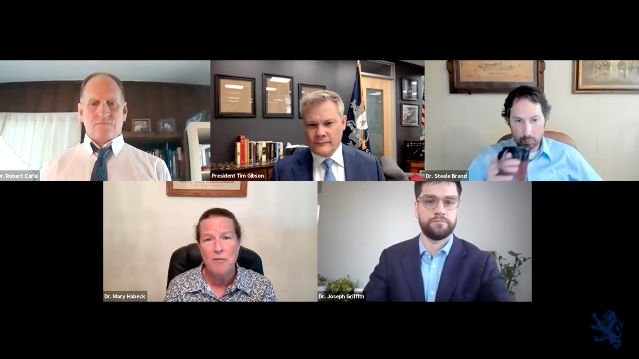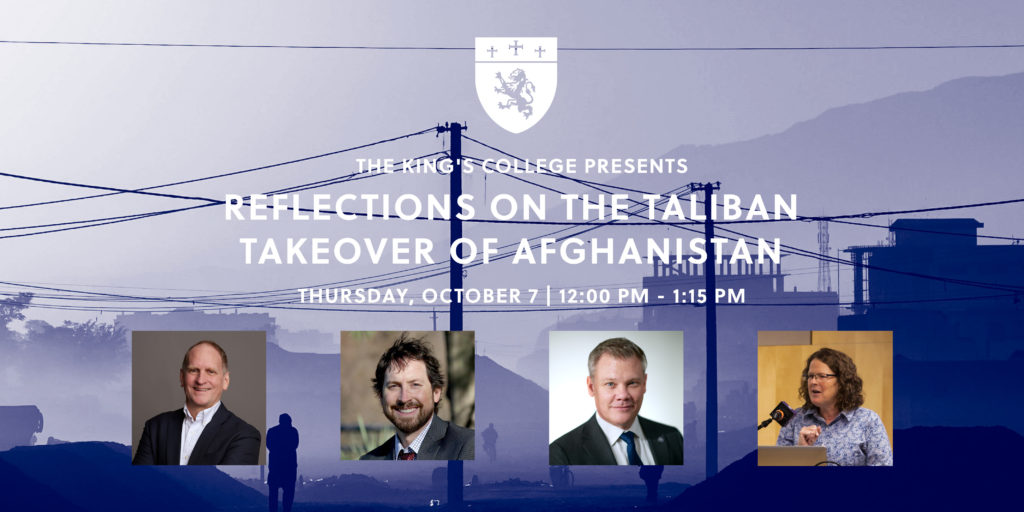Reflections on the Taliban Takeover of Afghanistan
Dr. Robert Carle, Dr. Mary Habeck, President Tim Gibson, and Dr. Steele Brand discussed the consequences of the Taliban being back in power.

On October 7, The King’s College hosted a panel discussion titled, “Reflections on the Taliban Takeover of Afghanistan.”
Moderated by Dr. Joseph Griffith, assistant professor of politics, the virtual event featured remarks from a diverse set of King’s presenters as well as guest Dr. Mary Habeck, author of Knowing the Enemy: Jihadist Ideology and the War on Terror. The event discussed the realities of America withdrawing from Afghanistan and explored the implications for global security.
WATCH: Full Panelist Presentations and Q&A
Griffith opened the panel discussion by reviewing the context for America’s war with Afghanistan, calling the events of September 11, 2001 the “deadliest terrorist attack in world history.” Noting the timeframe for the 20-year war, October 2001 to August 2021, Griffith went on to introduce the panelists and to highlight their credentials for joining the dialogue.
Dr. Robert Carle, professor of religious and theological studies, answered the question: “Who are the Taliban?” He distinguished between traditional Afghani Muslims who are “more mystical than dogmatic” and students who graduate from Deobandi Boarding Schools whom he characterizes as “dogmatic, rigid, intolerant, and violent.” Outlining the Taliban’s origin in 1979 when the Soviet Union invaded Afghanistan, Carle explained how Saudi Arabia and Pakistan funded thousands of Deobandi Boarding Schools in Afghani refugee camps along the Pakistani border to fight the Soviets.
Carle talked about the rise of Osama bin Laden, an “anti-Soviet communist jihadist” and son of a billionaire construction magnate, who moved to Afghanistan in the 1980s. Working with the Taliban, bin Laden built caves across Afghanistan to resist Soviet dominance. Eventually withdrawing in 1989, the Soviets left the country in civil unrest allowing the Taliban to set up a pariah state in 1994 that “shocked the world with its brutality.” Having defeated the Soviet Union, bin Laden built a fighting force called al-Qaeda under Taliban protection and then turned his ire toward America.
Dr. Mary Habeck, author of Knowing the Enemy: Jihadist Ideology and the War on Terror, answered the question: “Is this a war that should and could have been won?” Toward that aim, Habeck further defined “the enemy.” She demonstrated the extremists’ “global agenda” by pointing to the international invitation in the ’90s to radical Islamic groups across the world to train for guerilla warfare in their respective countries. She also demonstrated how al-Qaeda is not a small radicalized group, but one that is intertwined with the Taliban—“so if the attacks that were carried out on 9/11 were not just about al-Qaeda, but were in fact about the Taliban/al-Qaeda, the entire war fought afterward was really about preventing another 9/11 from occurring. And this is why this … was a war of necessity.”
As for whether the U.S. could have won the war, Habeck points to comprehensive reports by SIGAR, Special Inspector General for Afghanistan Reconstruction, in which the people closest to the situation posit, “this was a war that could not have been won by the United States” because “there were too many factors beyond our control.” Habeck critiqued U.S. decision-making in Afghanistan by pointing to the decision in 2009 to provide half the number of troops and a dramatically shortened timeframe than what was requested by the same military leaders who carried out a successful counterinsurgency in Iraq. Habeck also pointed to the Obama administration’s flawed comparison of the war in Afghanistan with the Vietnam war. The false analogy led them to believe “we were in an endless war that could not be won,” which historians argue was not the case. Habeck makes the case that “we could have [won the war] if we had done the same thing that we had done in Iraq.”
President of The King’s College Tim Gibson, Brig Gen USAF (Ret.), addressed the question: “How should the exit have unfolded?” As a former director of mobility forces, Gibson shared that there is a seven-step “military decision-making process.” He outlined the method of turning assumptions into facts for the development of a “collection plan” which serves as the basis for official decision making. However, “it’s clear that in the situation in Afghanistan that that military decision process did not unfold in a meaningful and recognizable manner” as demonstrated by the failure to hold the initiative which necessitated the deployment of the Civil Reserve Air Fleet and one battalion of the 82nd Airborne Division. The arbitrary establishment of deadlines and subsequent changes is yet another indicator there was not a well-crafted withdrawal plan.
Lastly, Gibson pointed out that the U.S. relied on Taliban forces for outer security around the Kabul airport because we had a “shared interest.” However, the Taliban did not have the capability to secure the perimeter and we failed to deploy the 82nd Airborne Division in its full capacity for one of its most capable mission sets—the security and operation of an airport. Gibson concluded his presentation by sharing the personal cost of the war in Afghanistan for two families.
Dr. Steele Brand, associate professor of history and former U.S. Army Tactical Intelligence Officer, spent time “Reflecting on Death, Defeat, and Disgrace.” Brand pondered the good he witnessed as an intelligence officer deployed to Afghanistan—from the proliferation of schools to improved quality of life. And, he shared negative examples—from a lack of knowledge of Afghani culture and history, to the military making it look like we were doing better than we actually were.
Regarding the “unsafe and disorderly” retreat from Afghanistan, Brand asserted that “ the deaths, the defeat and the disgrace have happened—they cannot be erased. So, did the troops or Afghans who died die in vain?” To answer that question, he offered reflections from Cicero, Augustine, and Plato. Brand used the writings of these three men to demonstrate how republics based on love of family, character, and piety win wars and achieve peace because they “teach people how to use courage” in the fight for virtuous things.
Drawing from Cicero’s writings on just war, Brand asserted Augustine would agree that the war in Afghanistan was motivated by a just cause. But Brand suggested the war digressed into “an old attempt at making a single unified political order.” In other words, “we tried to make our American story their story in an act of national hubris.” And, “we lacked the courage and consistency to finish the job.” Brand used the work of these three philosophers to call for individual humility and national repentance.
The Q&A period broadly addressed what the war on terror might look like going forward. Dialogue included remarks about America’s lack of resolve, comparisons between the war in Afghanistan and Vietnam, consequences for Afghanis, and the implications of our withdrawal from Afghanistan for the rest of the world—specifically with regard to Taiwan and China. The full conversation is available on YouTube.





